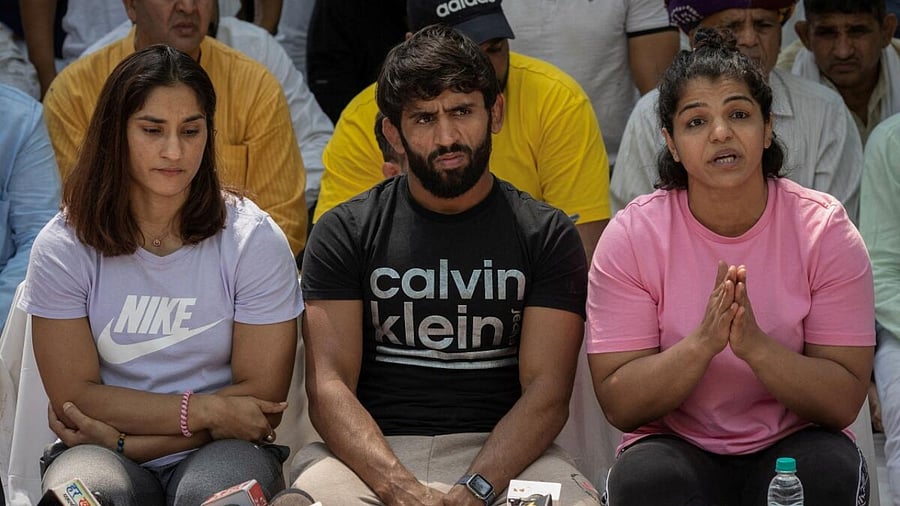
Legendary boxer Muhammad Ali threw into the Ohio River his 1960 Rome Olympics gold medal to protest against racism in the United States of America. India’s top wrestlers attempted to follow in Ali’s footsteps by planning to immerse their medals in the Ganga at Haridwar on May 30. They were prevented from doing so by farmer leader Naresh Tikait. The wrestlers, including Sakshi Malik, Vinesh Phogat, and Bajrang Punia, have been protesting for long against the Wrestling Federation of India (WFI) chief and Bharatiya Janata Party (BJP) parliamentarian Brij Bhushan Sharan Singh and demand his arrest on sexual harassment charges.
While dissuading the wrestlers from immersing their medals in the Ganga, Tikait gave an ultimatum of five days to the government. This ultimatum does not seem to have had any effect on the authorities concerned. Meanwhile, some of the protesting wrestlers have joined back their duties but insist that their protest will continue. The situation has been quite fluid and evolving ever since the wrestlers were brutally evicted form the protesting site at Jantar Mantar on May 28.
A question that arises is if the wrestlers had received at least some encouraging and adequate support from different quarters? Two protest movements at the same venue, Jantar Mantar, were more or less prodigiously successful were: one, the Anna Hazare anti-corruption movement; and, two, the agitation following the rape and death of a Delhi girl on a bus, a case which was later referred to as the Nirbhaya case. Civil society involvement occurred overpoweringly during those two occasions. Is it possible for us to dissect and analyse as to what triggers are basic and necessary for a successful movement or for an agitation to get support?
Corruption seems to raise the heckles of the public. All kinds of people and with varied backgrounds from film actors to sportspeople to academics to lawyers to sundry politicians jumped on to the Anna Hazare bandwagon. As far as the Nirbhaya case is concerned, the brutal and bone chilling incidents did deeply disturb and infuriate the collective conscience of the civil society.
The wrestlers protest, on the other hand, has to do with the humiliation and degrading attitude that they have had to face from the WFI authorities concerned, and involves sexual harassment. One of the complaints pertains to POCSO (Protection of Children from Sexual Offences). Apparently immediate arrests must be made, and have been done earlier, under this law. But that has not been so as regards the complaints of the wrestlers. Though the voice of the wrestlers has reached some international quarters, the State is not in a hurry to respond.
Besides, the reluctant police were moved to act and register cases against Singh only after the Supreme Court directed it to do so. The intervention of the court forces us to believe that the wrestlers have a strong case against the authorities of the WFI and Singh. No sportsperson in their right mind would go to the extent of laying their career and life on the line unless they have faced the stated kind of humiliation and harassment. For them it is the ‘all or none law’ that they are pursuing, and the stakes would indeed be very high if they have made any false allegation as is being stated by Singh.
The State is being perceived overall by activists, analysts and almost all in the Opposition as having grown extremely allergic to dissent, and anything that is thought to be different from the line of the government and the BJP. Hence, it would not be wrong to state that the strong and unwavering stand taken by the wrestlers is being seen as something that is against the State as Singh is an important leader for the BJP. All this includes strong notions of and vehement subscription to patriarchy and misogyny.
The reported truce that has been reached after a marathon six-hour meeting between the sports minister and the wrestlers seems to have been reached under duress from the point of the wrestlers as they appear to have succumbed to pressure. Else, why should it take so many parleys and such a long time for reaching an ‘amicable solution’. The wrestlers laid down their cards on the table, quite openly, and demanded Singh’s arrest. So, instead of the law taking its course and things being guided in the legal realm, it is the political game that is becoming prominent.
(MA Kalam, a social anthropologist, is Visiting Professor, Centre for Economic and Social Studies, Hyderabad.)
Disclaimer: The views expressed above are the author's own. They do not necessarily reflect the views of DH.